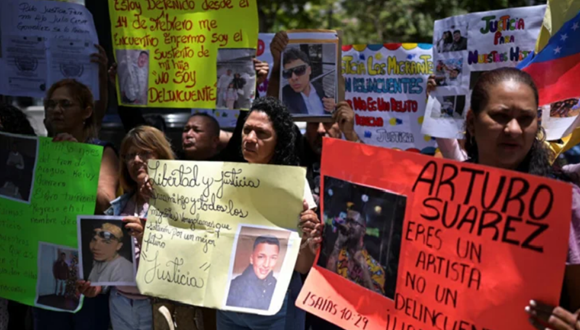
Caracas, Mar 26th. - A team of lawyers hired by the government of Nicolás Maduro filed a writ of habeas corpus before the Supreme Court of El Salvador on Tuesday, requesting the immediate release and repatriation of dozens of Venezuelans deported by the United States and detained in a maximum security prison in the Central American country.
The migrants, according to official figures, were accused by Washington of belonging to the criminal organization Tren de Aragua, but both the Venezuelan government and the relatives of the detainees categorically deny these accusations, claiming that they are ordinary citizens with no links to criminal groups.
Attorney Jaime Ortega, legal representative of the case, explained that although they initially filed the lawsuit on behalf of 30 Venezuelans who granted them notary powers, they will seek to extend the legal action to all the compatriots detained.
"We first demand their immediate release and, if not possible, that an orderly and systematic transfer and repatriation be carried out," Ortega told international media.
The situation originated when the United States deported Venezuelans using the Foreign Enemies Act, a wartime rule that was blocked in extremis by federal judge James Boasberg.
Despite the court order demanding the return of the flight, the U.S. authorities completed the deportation to El Salvador, where Venezuelans were held in a 23-hectare prison 70 km from San Salvador.
The move was made under an agreement whereby Washington would pay the Salvadoran government six million dollars to house the deportees.
President Nayib Bukele confirmed on Sunday, March 23, on social media the arrival of the 238 members of the Venezuelan criminal organization Tren de Aragua, although he did not provide evidence to support that claim.
Prison conditions have raised serious concerns. In his ruling, Judge Boasberg cited testimony of serious human rights violations, including systematic beatings, humiliation, irregular access to food and drinking water, and extreme overcrowding conditions that force inmates to sleep on their feet.
The legal status of detainees has multiple irregularities. David Morales, legal director of the NGO Cristosal, said that there is no legal basis for the imprisonment of Venezuelans in El Salvador - and described the arrests as arbitrary because they have not been subjected to any judicial process in Salvadoran territory.
The case is complicated by the political context of El Salvador, where a state of emergency has been in place since March 2022 that has suspended constitutional guarantees. In addition, the Central American country broke diplomatic relations with Venezuela in 2019, leaving detainees without consular assistance.
Legal experts such as Enrique Anaya warn that the lack of judicial independence in El Salvador, where the Bukele Government replaced the judges of the Constitutional Chamber in 2021 - considerably reduces the chances of success of habeas corpus. However, they stress that legal action serves to document irregularities and maintain international pressure on the case.
So far, neither the Attorney General of El Salvador nor the Presidential Commissioner for Human Rights have responded to requests for information on the legal status of Venezuelan prisoners, while the Bukele Government remains silent on the matter. (Text and Photo: Cubadebate)